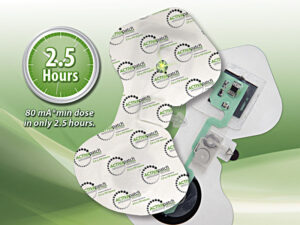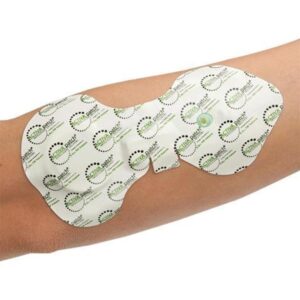

We provide Iontophoresis as a service
Iontophoresis uses electrical current provided by a small battery within the patch to pass medication through the skin. This treatment modality is useful in reducing inflammation. Most commonly, dexamethasone, ibuprofen, lidocaine, or acetic acid are used as medications. The patches used at this clinic are four hour one-time use patches that the patient is able to take home. After four hours, the patch is removed and discarded. Please let the therapist know if you have any medication allergies. Occasionally, the patient will notice a red tint to the skin or small white bumps after the patch is removed. These side effects will usually go away within a few hours.
What Injuries respond well to Iontophoresis?
Superficial tendon strains and inflammation respond well to Iontophoresis therapy. This includes, but is not limited to, lateral epicondylitis (tennis elbow), medial epicondylitis (golfers elbow), wrist strain and sprain, carpal tunnel, biceps tendon strain (long head in the bicipital groove), AC joint strain and inflammation (separated shoulder), SC joint inflammation, patella tendonitis (jumpers knee), achilles tendonitis, calcaneal osteophytes (heel spur).
Are there any risks associated with Iontophoresis?
Depending on the medication used, an individual will want to share any allergies he or she may have with the therapist. A common drug used is dexamethasone which is a steroid. Patients who have an sensitivity to steroids may want to avoid this medication. Ketaprofen, which is an NSAID, can be used in the place of dexamethasone. Ketaprofen is a non-steriodal drug option that still has anti-inflammatory properties.
If individuals are sensitive to a part of the iontophoresis, the sensitivity is usually caused from the adhesive that is used to adhere the patches to the body. Patients with a known sensitivity to tape or adhesive should let the therapist know. Even if a sensitivity to the adhesive exists, the patient usually experiences a light itching sensation which will go away after the patch is removed.
